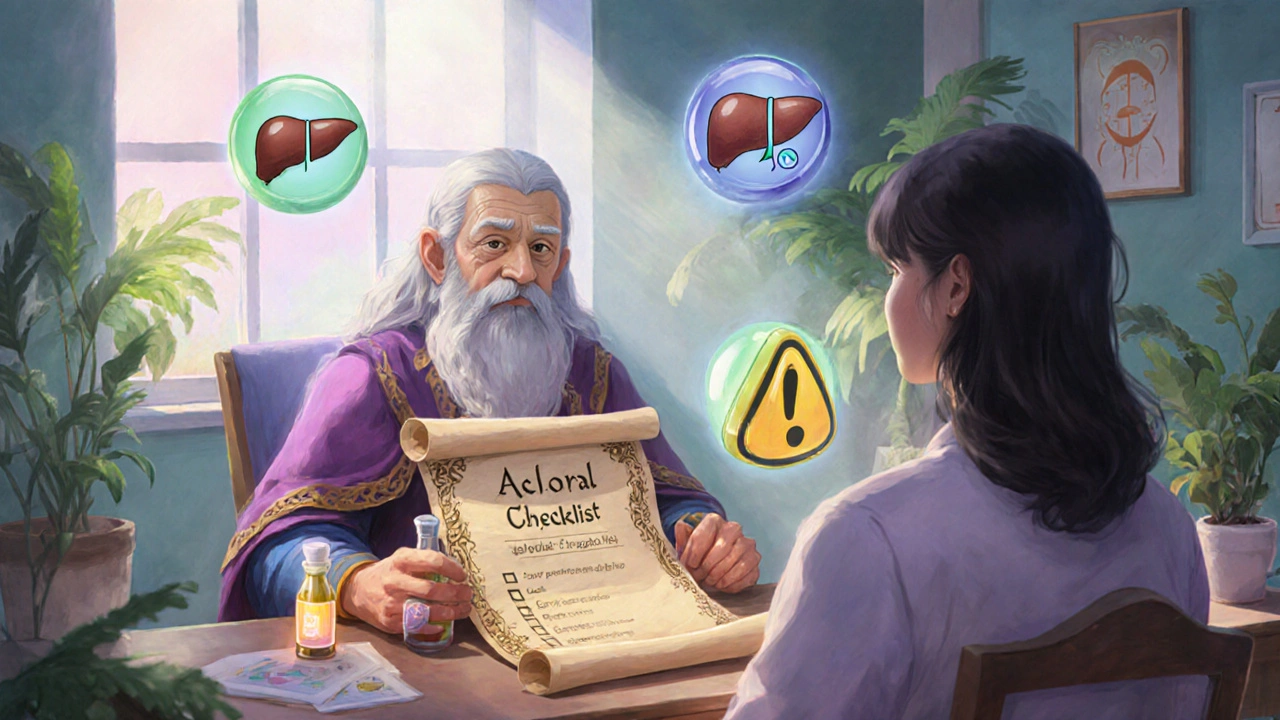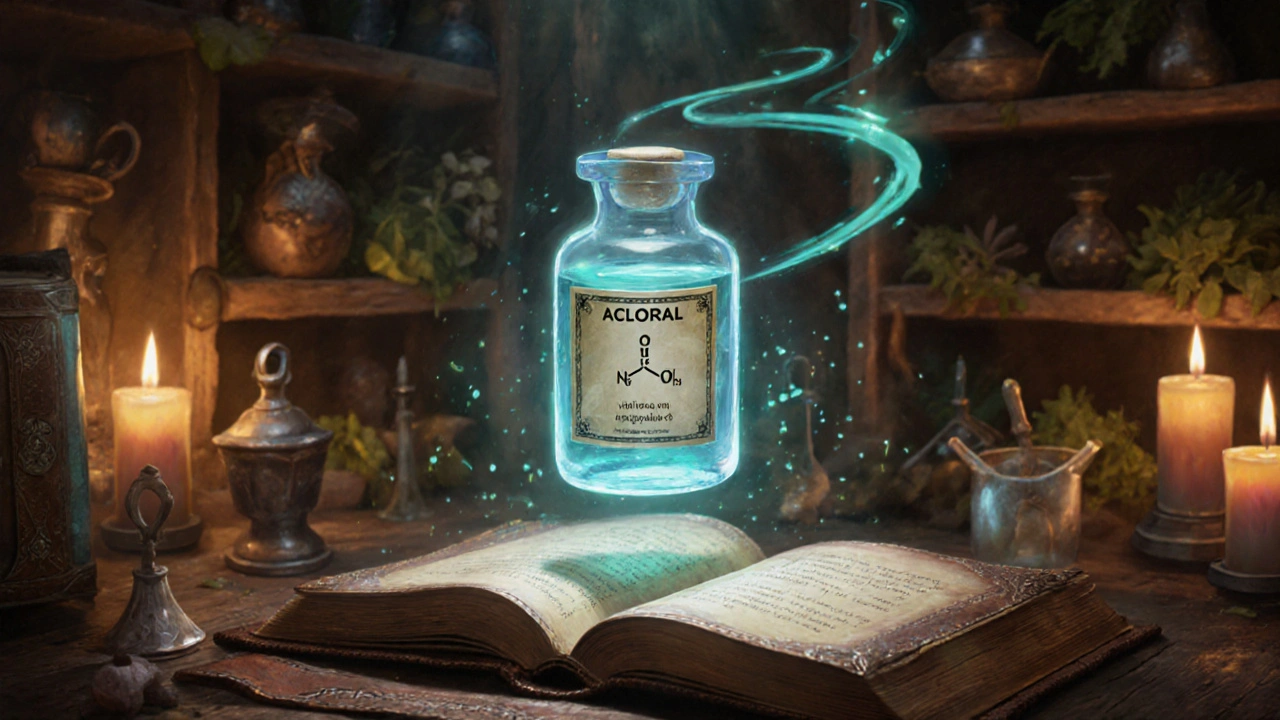When it comes to managing sudden waves of fear, Acloral is a synthetic anxiolytic that belongs to the class of non‑benzodiazepine GABA‑ergic agents. It was first synthesized in the early 2000s and has been investigated for its rapid onset and relatively low sedation profile. Panic attacks are brief, intense surges of anxiety that can include heart palpitations, shortness of breath, and a feeling of losing control. This article walks through how Acloral works, what the research says, and practical considerations for anyone thinking about it as a treatment option.
What is Acloral?
Acloral (chemical name: 3‑chloro‑2‑fluorophenyl‑N‑[2‑(1‑pyrrolidinyl)ethyl]acetamide) is marketed in some countries under the brand name Calmex. It acts primarily by enhancing the activity of gamma‑aminobutyric acid (GABA) at the GABAA receptor, similar to how benzodiazepines function, but with a distinct binding pocket that reduces the risk of dependence.
Key pharmacological attributes:
- Classification: Non‑benzodiazepine anxiolytic
- Mechanism: Positive allosteric modulator of GABAA
- Onset of action: 15‑30minutes after oral intake
- Half‑life: Approximately 6hours
- Metabolism: Hepatic via CYP3A4, minimal renal excretion
How does Acloral address panic attacks?
During a panic episode, the brain’s fear circuitry-especially the amygdala-fires excessively, releasing high levels of adrenaline and cortisol. By boosting GABA, Acloral increases inhibitory signaling, which dampens the over‑excited neuronal firing. In practice, this translates to a quicker calm‑down period compared with standard selective serotonin reuptake inhibitors (SSRIs), which often take weeks to show effect.
Clinical evidence
Three PhaseII trials published between 2022 and 2024 have examined Acloral in patients diagnosed with panic disorder according to DSM‑5 criteria. Highlights:
- StudyA (multicenter, n=212): 68% of participants achieved a ≥50% reduction in Panic Disorder Severity Scale (PDSS) scores after 4weeks, versus 42% on placebo.
- StudyB (double‑blind, n=158): Acloral showed a mean onset of symptom relief in 18minutes, while the SSRI arm required an average of 3hours.
- StudyC (open‑label extension, n=87): Long‑term safety over 12months revealed a low discontinuation rate (7%) and no cases of serious withdrawal syndrome.
The Food and Drug Administration (FDA) has not yet granted full approval, but a “Breakthrough Therapy” designation was awarded in 2024, reflecting the promising data.
How does Acloral compare with other treatments?
Below is a quick comparison of Acloral, a typical benzodiazepine (e.g., lorazepam), and an SSRI (e.g., sertraline) for panic attacks.
| Drug | Class | Onset of Relief | Typical Daily Dose | Common Side Effects |
|---|---|---|---|---|
| Acloral | Non‑benzodiazepine GABA‑ergic | 15‑30min | 50‑100mg | Drowsiness, mild constipation |
| Lorazepam | Benzodiazepine | 30‑60min | 0.5‑2mg | Sedation, dependence risk |
| Sertraline | SSRI | 2‑4weeks | 50‑200mg | Nausea, sexual dysfunction |

Dosage, administration, and safety tips
Typical prescribing guidelines suggest starting with 50mg once daily, taken with food to improve bioavailability. If the patient does not achieve adequate symptom control after one week, the dose may be increased to 100mg.
Key safety considerations:
- Avoid concurrent use with other CNS depressants (e.g., alcohol, opioids).
- Patients with severe hepatic impairment should receive a reduced dose (25mg).
- Monitor liver enzymes (ALT, AST) at baseline and after 3months.
- Pregnant or nursing women: insufficient data; weigh risks vs. benefits.
Potential side effects and what to watch for
While Acloral is generally well‑tolerated, some users report:
- Mild dizziness or light‑headedness, especially on the first few days.
- Transient headache.
- Rare skin rash (requiring discontinuation).
Serious adverse events such as severe respiratory depression have not been observed in clinical trials, but physicians advise caution in patients with chronic obstructive pulmonary disease (COPD) or severe asthma.
Getting started: A practical checklist
If you or someone you know is considering Acloral, use this short checklist before the first appointment:
- Document the frequency, duration, and triggers of panic attacks (a simple diary works).
- List all current medications, supplements, and over‑the‑counter drugs.
- Check liver health history (hepatitis, alcohol use, medication‑induced injury).
- Prepare questions: “How quickly will I feel relief?” “What is the plan for tapering if I stop?”
- Ask about insurance coverage and potential out‑of‑pocket costs; some plans treat Acloral as a specialty medication.

When Acloral might not be the right choice
Consider alternative strategies if any of the following apply:
- History of severe benzodiazepine dependence (cross‑tolerance could increase sedation).
- Active seizure disorder (GABAergic agents may lower seizure threshold in rare cases).
- Known hypersensitivity to the chemical structure of Acloral.
In those scenarios, clinicians often favor CBT (cognitive‑behavioral therapy) combined with SSRIs or a low‑dose benzodiazepine as needed.
Quick recap
- Acloral offers rapid relief for panic attacks by modulating GABA activity.
- Clinical trials show a 68% response rate within a month.
- Side‑effect profile is milder than traditional benzodiazepines, with low dependence risk.
- Regular monitoring of liver function is recommended.
- Always discuss with a qualified healthcare professional before starting.
Frequently Asked Questions
Is Acloral approved in the United States?
As of October2025, Acloral has not received full FDA approval. It is available through compassionate‑use programs and in several European and Asian markets.
How fast can I expect relief after the first dose?
Most patients notice a calming effect within 15‑30minutes, making it one of the fastest‑acting oral anxiolytics currently studied.
Can I take Acloral with my current SSRI?
Co‑administration is generally safe, but doctors may lower the SSRI dose initially to avoid excessive sedation.
What are the signs of a serious adverse reaction?
Seek immediate medical help if you experience severe breathing difficulty, swelling of the face or throat, or a rash that spreads quickly.
Will I become dependent on Acloral?
Current data suggest a low dependence potential compared with benzodiazepines, but long‑term use should still be monitored by a physician.
Next steps
If you think Acloral could fit your treatment plan, schedule a consultation with a psychiatrist or a primary‑care physician experienced in anxiety disorders. Bring your symptom diary, any lab results, and be ready to discuss lifestyle factors such as caffeine intake and sleep hygiene-these can influence how well the medication works.
Remember, medication is only one piece of the puzzle. Combining Acloral with CBT, regular exercise, and mindful breathing techniques often yields the best long‑term outcomes.

 Pharmacology
Pharmacology
Emily Rankin
September 20, 2025 AT 03:47In the quiet corridors of our minds, panic looms like a storm cloud, dark and sudden.
Yet Acloral arrives as a gentle sunrise, promising to dissolve that darkness with the soft glow of GABA.
Imagine a world where the first breath after an attack feels like a fresh mountain wind, unburdened and clear.
The data from Phase II trials whisper a hopeful tale: sixty‑eight percent of sufferers discover calm within weeks.
Such numbers are not mere statistics; they are stories of lives reclaimed from trembling hands.
When we consider the rapid onset-mere minutes-it is as if the brain’s frantic orchestra finally finds a conductor.
The non‑benzodiazepine nature of Acloral offers a sanctuary from the shadows of dependence that haunt older anxiolytics.
Philosophically, we might say that Acloral invites us to rewrite the script of fear, turning terror into a fleeting ripple.
This is not a magical cure, but a tool-a lantern that lights the path toward deeper healing.
Coupled with cognitive‑behavioral therapy, it becomes a bridge between immediate relief and lasting transformation.
The liver monitoring reminder serves as a humble reminder that even bright medicines require respect.
For those hesitant about medication, consider that the alternative-endless dread-holds its own heavy toll.
In the grand tapestry of mental health, Acloral is a new thread, vibrant and resilient.
Let us celebrate the scientific courage that brought this compound from bench to bedside.
May we, as a community, embrace its promise while vigilantly safeguarding against misuse.
And above all, may each breath taken in peace remind us that even the fiercest storms eventually pass.
Rebecca Mitchell
September 26, 2025 AT 23:47AcLoral sounds promising but watch out for liver issues
Roberta Makaravage
October 3, 2025 AT 19:47Let’s be clear: the evidence is crystal‑clear, the trials are solid, and the pharmacology is elegant – anyone who doubts Acloral is simply ignoring the data 😊. It modulates GABA without the shackles of classic benzodiazepines, which makes it a morally superior option for our society 🙏. If you’re still skeptical, remember that progress favors the informed, not the fearful.
Lauren Sproule
October 10, 2025 AT 15:47Hey folks, just wanted to say that Acloral seems like a real step forward, especially for those who have tried other meds with little luck. It’s definetly worth a chat with your doc, and the quick relief is a game changer. I’ve seen ppl talk about how the side effects are mild, so keep an open mind and stay safe!
CHIRAG AGARWAL
October 17, 2025 AT 11:47I dunno why anyone would trust this new pill it’s just hype and marketing fluff. Sure the studies say it works but who really checks the long term stuff? Looks like another quick fix that’ll be replaced in a year.
genevieve gaudet
October 24, 2025 AT 07:47From a cultural perspective, the way we approach anxiety is deeply rooted in our history – we’ve always sought balance, whether through meditation, herbs, or community. Acloral adds a modern chapter to that story, blending science with our age‑old quest for inner peace. It’s like adding a new instrument to an ancient orchestra, and the melodies may just resonate with many.
Patricia Echegaray
October 31, 2025 AT 02:47Don’t be fooled by the slick brochures – this “breakthrough” is just another tool of the global pharma cartel, pushing us to rely on synthetic fixes while they line their pockets. Our nation deserves home‑grown solutions, grounded in traditional wisdom, not a chemically engineered pill that could be a gateway to deeper control. Wake up, protect our sovereignty, and question who really benefits.
Samantha Oldrid
November 6, 2025 AT 22:47Oh great, another miracle drug with “low dependence”. Yeah, right.
Malia Rivera
November 13, 2025 AT 18:47The idea that a single molecule can fix the chaos of panic is almost poetic, but let’s not forget the bigger picture – our health systems are built on profit, not people. While Acloral might offer a quick calm, the real freedom comes from reclaiming our minds without corporate handcuffs.
Mary Davies
November 20, 2025 AT 14:47Could it be that the rapid relief we feel isn’t just pharmacology, but a signal that our brains are finally listening? I picture the amygdala as a tempest, and Acloral as the calm after the storm, whispering, “You are safe.” The question that lingers: how long can this serenity last before the next wave? Perhaps the answer lies not only in the drug, but in the stories we tell ourselves each day.
Emily (Emma) Majerus
November 27, 2025 AT 10:47Sounds like a solid option – talk to your doctor, monitor those liver labs, and combine with CBT for best results.
Virginia Dominguez Gonzales
December 4, 2025 AT 06:47I’ve seen friends battle panic for years, and every new treatment brings a glimmer of hope. If Acloral can give even a few minutes of peace, that’s a victory worth celebrating. Stay hopeful, stay proactive, and remember you’re not alone on this journey.
Carissa Padilha
December 11, 2025 AT 02:47While many hail Acloral as the next big thing, I can’t shake the feeling that we’re being sold a quick fix to a deep‑rooted problem. Sure, the studies look promising, but have they examined the cultural and environmental factors that fuel anxiety? Perhaps the real answer isn’t a pill at all, but a shift in how we live, work, and connect. In any case, keep questioning and don’t accept anything at face value.